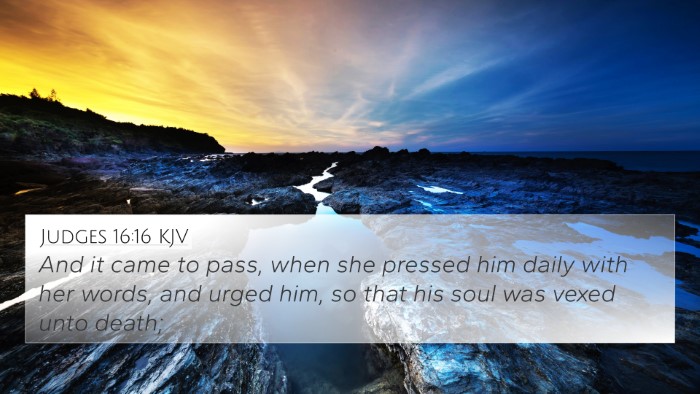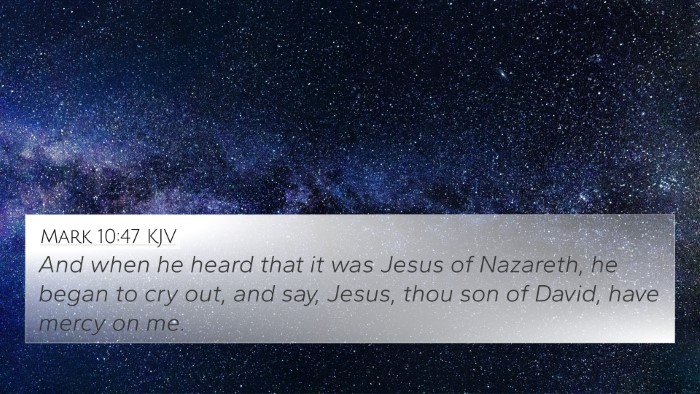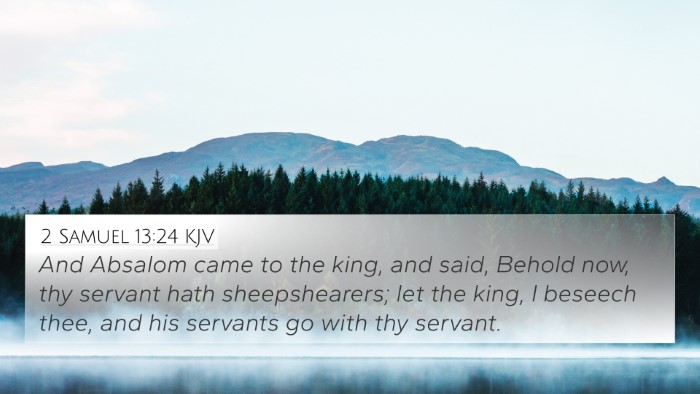Understanding Luke 18:5
Luke 18:5 states, "Yet because this widow troubles me, I will avenge her, lest by her continual coming she weary me." This verse is part of a parable told by Jesus regarding prayer and faith. It emphasizes the importance of persistence in seeking justice and how even an unjust judge can be swayed by such unwavering determination.
Context and Overview
In this passage, Jesus presents a parable about a widow who persistently approaches an unjust judge to seek justice against her adversary. The judge, lacking compassion and moral integrity, ultimately grants her request not out of kindness, but simply to stop her from troubling him further. This story forms a foundational lesson on the power of perseverance in prayer.
Insights from Public Domain Commentaries
Gathering insights from renowned commentaries such as those by Matthew Henry, Albert Barnes, and Adam Clarke enhances our understanding of this verse:
- Matthew Henry: He emphasizes that the judge's eventual response is a testament to the power of persistent prayer. The widow represents all believers who seek justice and mercy from God, showcasing that God is far more gracious than even the unjust judge.
- Albert Barnes: Barnes draws attention to the contrast between the earthly judge and God, suggesting that if a wicked judge can be persuaded through persistence, surely God, who is just and loving, will respond to the cries of His people who call upon Him faithfully.
- Adam Clarke: Clarke elaborates on the social context, noting that widows were particularly vulnerable in society and often lacked legal representation. The widow’s persistence signifies the need for believers to be steadfast in prayer and advocacy, especially for those who are marginalized.
Thematic Connections and Cross-References
The message of Luke 18:5 resonates through various scriptures, reinforcing the themes of justice, persistence in prayer, and the character of God in responding to His people:
- Luke 11:5-10: This passage includes the parable of the friend at midnight, illustrating the need for persistence in seeking blessings and support from God.
- Matthew 7:7-8: Here, Jesus instructs His followers to ask, seek, and knock—emphasizing that God is willing to respond to those who diligently seek Him.
- 1 Thessalonians 5:17: Paul encourages believers to "pray without ceasing," echoing the theme of steadfastness in communication with God.
- James 5:16: This verse points out the effective nature of prayer from the righteous, further emphasizing that God hears and responds to genuine supplication.
- Psalm 34:15: The verse indicates that the Lord's eyes are on the righteous and He hears their cries, reinforcing the assurance of divine attention and justice.
- Psalm 9:9: It reassures that God is a refuge for the oppressed, marking His character as protector of those in need, similar to the widow in the parable.
- Isaiah 1:17: This calls for justice and advocacy for the marginalized, resonating with the widow’s plight in Luke 18.
Implications for Believers
The implications for contemporary believers from this verse are profound:
- It teaches the necessity of persistent prayer, encouraging believers to approach God with fervor.
- It underlines the importance of justice and advocacy for the oppressed, urging followers of Christ to embody these values in their communities.
- It reassures believers that God is inherently just and compassionate, contrasting Him with the unjust judge, and inspiring confidence in God's response to our prayers.
Conclusion
Luke 18:5 serves as a powerful reminder of the effectiveness of perseverance in prayer and advocacy. Through the insights from various public domain commentaries and cross-references to other biblical texts, it becomes evident that God values persistent faith and ensures justice for His faithful followers. By understanding this passage within its broader biblical context, believers can deepen their faith and commitment to prayer, embodying the tenacity demonstrated by the widow in their own lives.
To further explore the relationships between Bible verses and how themes are interconnected, consider utilizing tools for Bible cross-referencing such as Bible concordances and cross-reference guides. These resources can greatly enhance your understanding of biblical texts and facilitate a deeper engagement in cross-referenced Bible study methods.








